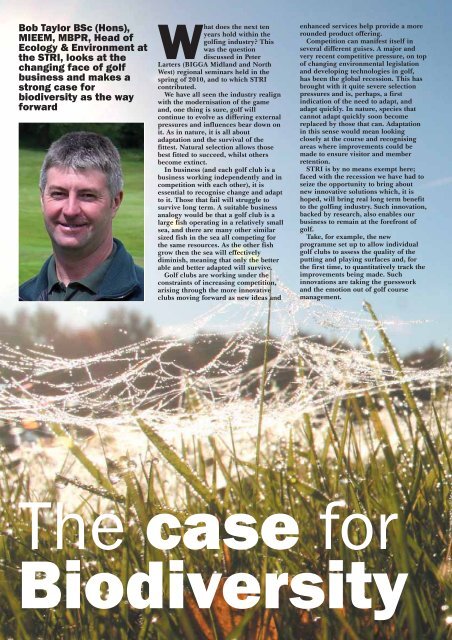Marshalling his troops - Pitchcare
Marshalling his troops - Pitchcare
Marshalling his troops - Pitchcare
Create successful ePaper yourself
Turn your PDF publications into a flip-book with our unique Google optimized e-Paper software.
Bob Taylor BSc (Hons),<br />
MIEEM, MBPR, Head of<br />
Ecology & Environment at<br />
the STRI, looks at the<br />
changing face of golf<br />
business and makes a<br />
strong case for<br />
biodiversity as the way<br />
forward<br />
What does the next ten<br />
years hold within the<br />
golfing industry? T<strong>his</strong><br />
was the question<br />
discussed in Peter<br />
Larters (BIGGA Midland and North<br />
West) regional seminars held in the<br />
spring of 2010, and to which STRI<br />
contributed.<br />
We have all seen the industry realign<br />
with the modernisation of the game<br />
and, one thing is sure, golf will<br />
continue to evolve as differing external<br />
pressures and influences bear down on<br />
it. As in nature, it is all about<br />
adaptation and the survival of the<br />
fittest. Natural selection allows those<br />
best fitted to succeed, whilst others<br />
become extinct.<br />
In business (and each golf club is a<br />
business working independently and in<br />
competition with each other), it is<br />
essential to recognise change and adapt<br />
to it. Those that fail will struggle to<br />
survive long term. A suitable business<br />
analogy would be that a golf club is a<br />
large fish operating in a relatively small<br />
sea, and there are many other similar<br />
sized fish in the sea all competing for<br />
the same resources. As the other fish<br />
grow then the sea will effectively<br />
diminish, meaning that only the better<br />
able and better adapted will survive.<br />
Golf clubs are working under the<br />
constraints of increasing competition,<br />
arising through the more innovative<br />
clubs moving forward as new ideas and<br />
enhanced services help provide a more<br />
rounded product offering.<br />
Competition can manifest itself in<br />
several different guises. A major and<br />
very recent competitive pressure, on top<br />
of changing environmental legislation<br />
and developing technologies in golf,<br />
has been the global recession. T<strong>his</strong> has<br />
brought with it quite severe selection<br />
pressures and is, perhaps, a first<br />
indication of the need to adapt, and<br />
adapt quickly. In nature, species that<br />
cannot adapt quickly soon become<br />
replaced by those that can. Adaptation<br />
in t<strong>his</strong> sense would mean looking<br />
closely at the course and recognising<br />
areas where improvements could be<br />
made to ensure visitor and member<br />
retention.<br />
STRI is by no means exempt here;<br />
faced with the recession we have had to<br />
seize the opportunity to bring about<br />
new innovative solutions which, it is<br />
hoped, will bring real long term benefit<br />
to the golfing industry. Such innovation,<br />
backed by research, also enables our<br />
business to remain at the forefront of<br />
golf.<br />
Take, for example, the new<br />
programme set up to allow individual<br />
golf clubs to assess the quality of the<br />
putting and playing surfaces and, for<br />
the first time, to quantitatively track the<br />
improvements being made. Such<br />
innovations are taking the guesswork<br />
and the emotion out of golf course<br />
management.<br />
The case for<br />
Biodiversity


